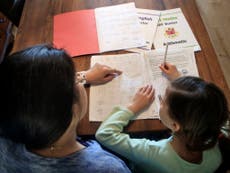Women hit by Covid recession feel ‘forgotten’ as government risks turning clock back on gender equality, MPs warn
'It is a shocking indictment that we have only had a handful of female cabinet members fronting the daily briefings,' says Labour MP

Your support helps us to tell the story
From reproductive rights to climate change to Big Tech, The Independent is on the ground when the story is developing. Whether it's investigating the financials of Elon Musk's pro-Trump PAC or producing our latest documentary, 'The A Word', which shines a light on the American women fighting for reproductive rights, we know how important it is to parse out the facts from the messaging.
At such a critical moment in US history, we need reporters on the ground. Your donation allows us to keep sending journalists to speak to both sides of the story.
The Independent is trusted by Americans across the entire political spectrum. And unlike many other quality news outlets, we choose not to lock Americans out of our reporting and analysis with paywalls. We believe quality journalism should be available to everyone, paid for by those who can afford it.
Your support makes all the difference.Women bearing the brunt of the financial fallout from the Covid crisis feel “forgotten” by the government, as ministers risk turning the clock back on gender equality, MPs have warned.
The Women and Equalities Committee, which has carried out an inquiry into the pandemic’s economic on women, said the government has both ignored and exacerbated pre-existing inequalities women face.
Women are over-represented in industries worst hit by lockdown measures such as retail, hospitality, tourism, the arts and the beauty sector, while research has found they have taken on the majority of homeschooling and childcare, regardless of whether they are in paid employment or not.
Alex Davies-Jones, who sits on the Women and Equalities Committee, told The Independent that many women working in female-dominated sectors are self-employed, but have fallen through the cracks for the government’s self-employment schemes and are not receiving support.
The Labour MP for Pontypridd in Wales added: “Retail, hospitality, beauty salons and hairdressing were the first to close because of the virus and the last to open. These seemingly forgotten industries significantly contribute to the economy. The women working in these industries have been forgotten.
“The government needs to have women around the table when they are creating these policies. It is a shocking indictment that we have only had a handful of female cabinet members fronting the daily briefings. There is a shocking absence of women at the top.
“Also none of the policies are fronted by women, which is really disappointing. This reflects the women I’ve been speaking to who feel this government doesn’t reflect their experiences and doesn’t see them and therefore doesn’t devise policy to help them through this situation.”
The inquiry identifies a slew of recommendations for the government which include passing laws to expand redundancy protection to pregnant women and new mothers, reintroduce gender pay gap reporting, and carry out an Equality Impact Assessment of schemes which help both workers and those who are self-employed.
Caroline Nokes, the committee's chair, said: “As the pandemic struck, the government had to act quickly to protect jobs and adapt welfare benefits. These have provided a vital safety net for millions of people. But it overlooked the labour market and caring inequalities faced by women. These are not a mystery, they are specific and well understood.
“And yet the government has repeatedly failed to consider them. This passive approach to gender equality is not enough. And for many women it has made existing equality problems worse: in the support to self-employed people, to pregnant women and new mothers, to the professional childcare sector, and for women claiming benefits. And it risks doing the same in its plans for economic recovery.”
Ms Nokes said government policies have “repeatedly skewed towards men” as she called for ministers to begin taking proactive efforts to examine every policy’s equality impact or risk “turning the clock back”.
Kate Osborne, who sits on the committee, told The Independent the government must announce whether it will extend its £20 per month rise to Universal Credit – adding that the policy affects women a great deal.
“How can you plan ahead financially if you do not know how much money you will have,” the Labour MP for Jarrow added. “Women need to know if the £20 is going to continue. It is so unhelpful of the government not to tell people yet. There should also be a £20 uplift on other legacy benefits.”
The report suggested investment schemes to help the economy in the wake of the Covid crisis “skew” towards industries which are heavily dominated by men.
Joe Levenson, of Young Women’s Trust, said: “We’ve even heard from many young women who are skipping meals to make ends meet and in the last year 69 per cent of young women claiming benefits did so for the first time.
“Yet despite the devastating economic impact, women have been neither seen nor heard by the government during the pandemic, which is why today’s powerful report from the Women and Equalities Committee is so important.”
A government spokesperson said during the Covid crisis the government has “done whatever it takes” to safeguard “lives and livelihoods, and will continue to do so”.
“We are safeguarding people’s jobs and incomes with economic schemes worth over £200bn, including the Self Employment Income Scheme for the 1.7 million self-employed women in the UK,” the representative added.
“Covid-19 is prompting a culture shift, with more people than ever before working flexibly, and the government wants to harness that as we recover. By doing so, we could see more equal sharing of care work by parents, and more flexibility from employers, enabling us to unleash the potential of everyone across the country.”

Join our commenting forum
Join thought-provoking conversations, follow other Independent readers and see their replies
Comments